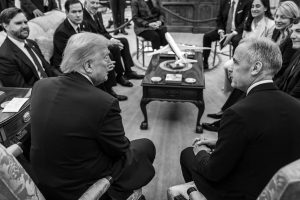 –Editorial
–Editorial
President Donald Trump announced that he will raise tariffs on Canadian imports by an additional 10% after a television ad aired in Ontario criticized U.S. tariffs using the words of former President Ronald Reagan. The ad prompted Trump to suspend trade talks with Canada, calling the campaign a “fraud” and a “hostile act” against the United States.
Ontario Premier Doug Ford said he would withdraw the ad after the weekend, following discussions with Canadian officials. The ad campaign, part of a $75 million initiative launched Oct. 23, featured Reagan’s 1987 address on free and fair trade, warning that tariffs harm American workers. The spots were scheduled to air during the World Series on Oct. 25 and 26.
Trump made the tariff announcement while en route to Malaysia, posting on Truth Social that Ontario’s campaign misrepresented U.S. trade policy and undermined ongoing negotiations.
The tariff increase adds to escalating trade tensions between Washington and Ottawa, which began on February 1, 2025, when Trump imposed sweeping tariffs on Canadian goods, including a 25% levy on most imports and a 10% tariff on energy products. Canada responded with retaliatory tariffs valued at $30 billion, later expanding to $155 billion.
The measures have disrupted long-standing economic cooperation, strained diplomatic relations, and forced industries in both countries to adjust to supply chain challenges. Tariffs have expanded to cover steel, aluminum, automobiles, and a wide range of consumer goods.
British Columbia Premier David Eby said earlier this month that new U.S. tariffs would result in higher duties on Canadian softwood lumber than on Russian lumber, despite Western sanctions on Moscow.
The White House has defended the tariffs as a necessary response to what it calls Canada’s failure to address illicit drug and migration flows across the northern border. Canadian Prime Minister Justin Trudeau and Foreign Minister Mélanie Joly have rejected those claims, citing data showing that less than 1% of fentanyl and illegal migration to the U.S. originates from Canada.
Economists, including Nobel Laureate Joseph Stiglitz, have warned that the tariffs could drive inflation and global economic instability. The Royal Bank of Canada has described the trade conflict as the country’s most severe trade shock in nearly a century.
Canada has filed a complaint with the World Trade Organization, arguing that the U.S. tariffs violate international trade rules. Negotiations between both governments remain stalled amid growing political tension and economic uncertainty across North America.


